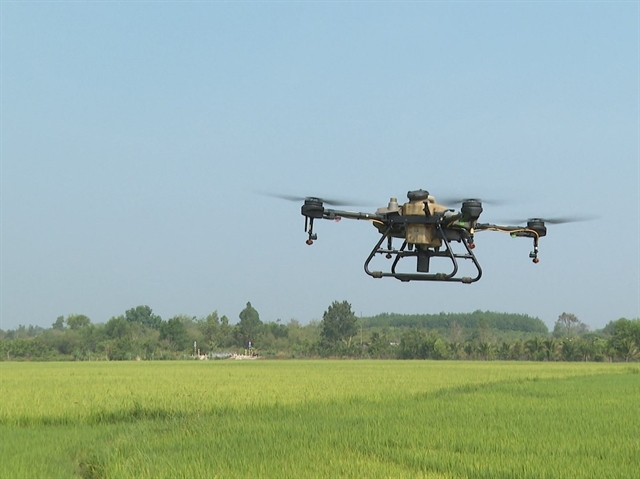 Society
Society

 |
| A drone spraying pesticide on a paddy field in Bình Phước Province. Greater efforts are needed to accelerate the digital transformation in agriculture. — VNA/VNS Photo |
HÀ NỘI — More than two million farmer households have been trained with digital skills, with more than 50,000 farm products now on sale on e-commerce platforms, demonstrating a growing efficiency in the digital transformation of the agricultural sector, Nguyễn Quốc Toản, Director of the Centre for Digital Transformation and Agricultural Statistics said.
Speaking at a meeting on Tuesday in Hà Nội, Toản said that farmers are the centre of moves into a digital space.
Minister of Agriculture and Rural Development Lê Minh Hoan said that with digital transformation, even if there are fewer people working in agriculture, there are still ways and tools which can be used to profit from the land.
Hoan stressed that technology-powered development is also a way towards sustainable and green development in Việt Nam.
For cooperatives and farmers, digital transformation is a multi-channel solution, including digital platforms, e-commerce channels, using social channels to market agricultural produce, which in turn will produce data to help shape production and distribution.
However, greater efforts are needed to accelerate the digital transformation in agriculture, according to the Ministry of Agriculture and Rural Development.
The focus will now be on enhancing research and development, the application of technology, as well as innovation to speed up digital transformation and development in the agricultural digital economy - the three streams being agriculture, rural development and farmers themselves.
It is also necessary to develop big data for the sector to increase the application of digital technologies and help farmers increase quality and yield.
Deputy Prime Minister Trần Lưu Quang asked the agriculture ministry to speed up administrative reforms and develop a standardised database for the sector, including planting, husbandry, aquaculture, forestry and irrigation.
Investments should prioritise the development of the information and technology infrastructure and a structure system for high-tech crop and husbandry zones.
It is also important to create strong bonds between agricultural enterprises and technology start-up firms to develop smart and modern agricultural value chains, he said. — VNS




